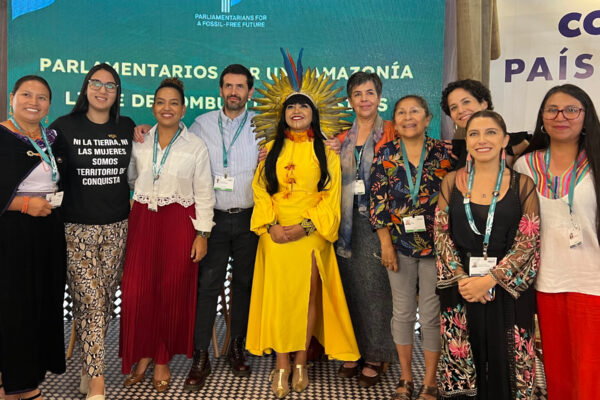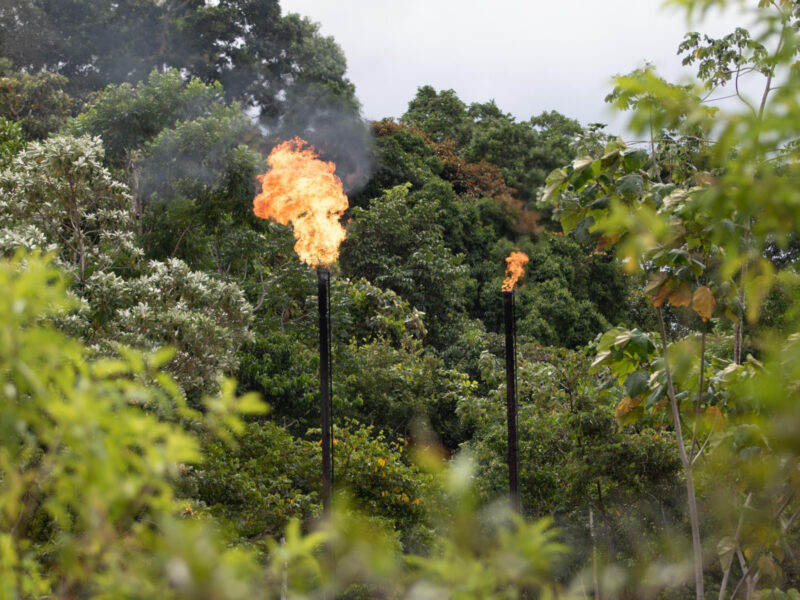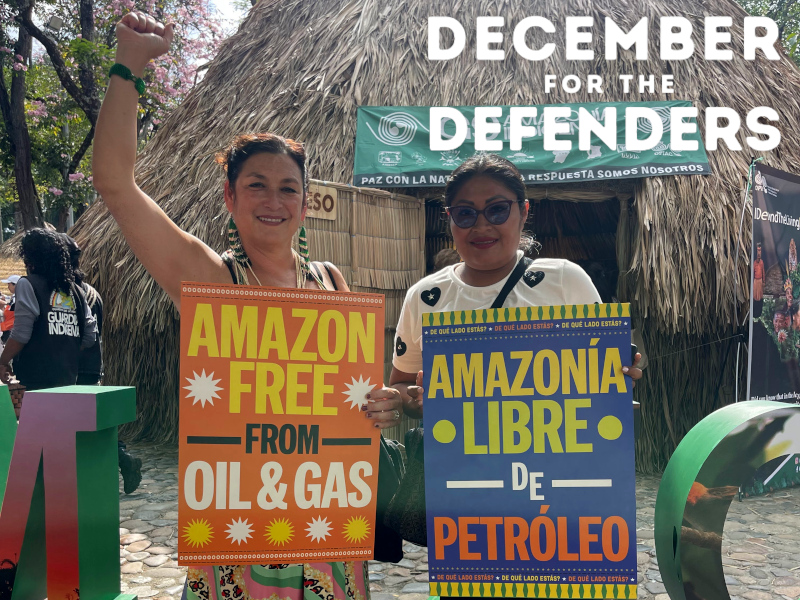It took the three Achuar tribal leaders nine days to journey from their homes in the Peruvian Amazon to San Francisco, most of the time spent traveling by river in a small motorboat. They flew in a plane for the first time and marveled that the airliner that brought them from Lima could stay aloft for eight hours.
The Achuar live deep in the Amazon rain forest, and their villages have had minimal contact with the modern world and its energy-hungry machines. But once again, the elders believe, the global demand for oil threatens their way of life. Talisman Energy, a Canadian oil company, is the latest to begin drilling exploratory wells in their traditional territory.
“We haven’t come to San Francisco to see the sights,” said tribal elder Pitiur Unti Saant, wearing a traditional headdress made of toucan feathers and speaking in Achuar through translators. “We have come to defend our territory. We have come very far to make sure that Talisman respects us and listens to us. We don’t want them on our land.”
Saant and his fellow Achuar leaders stopped in California en route to Calgary, Canada, where they were greeted with snow and cold before meeting Tuesday with representatives of Talisman. They make their case to shareholders at the company’s annual meeting today. A spokeswoman for Talisman said the company is trying to work closely with the Achuar and protect the sensitive environment.
On the trip north, Saant, 55, was joined by Tayujin Shuwi Peas, 65, a tribal elder who wears long sticks through his earlobes along with his toucan feather headdress, and Cesar Zunuga Butuna, 41, president of the Federation of the Achuar Nationality of Peru.
The trio has the support of Amazon Watch, a San Francisco-based group that has fought to prevent destruction of the rain forest. Noting the disaster caused by the oil well blowout in the better-regulated Gulf of Mexico, Amazon Watch warns that the likelihood of environmental damage is significant if oil extraction proceeds in the Achuar’s remote territory.
Native people in the Amazon have a long history of fighting oil drilling. Some of the Achuar are suing Los Angeles-based Occidental Petroleum in the U.S. for contamination it allegedly caused before pulling out of Peru. And Chevron Oil is facing a $27 billion suit in neighboring Ecuador for pollution caused by Texaco, which Chevron subsequently acquired. Amazon Watch is involved in both cases.
Amazon Watch also is fighting a massive proposed dam in Brazil. In March, “Avatar” Director James Cameron traveled up the Amazon with members of the group to meet tribal leaders and speak out against the project. He compared the plight of the Amazon’s indigenous people to the Navi on his movie’s fictional planet, Pandora.
In San Francisco, the visiting Achuar leaders met actor Peter Coyote, an Amazon Watch board member, along with dozens of other supporters and donors.
Saant said in an interview that waste from an exploratory well dug by Talisman a three-hour walk from his village of Unkum has already begun poisoning wildlife that his people depend on for survival.
Drilling waste was placed in a large pit and covered with a plastic sheet and soil, he said, but began seeping out after a rainfall. He said he saw wild boar and armadillos, apparently attracted by the salty flavor, eat some of the waste. When hunters from his village killed a boar in the area, he said, a chemical taste made the meat inedible.
He said that he reported the spill to company representatives in January but that it had not been cleaned up.
Phoebe Buckland, a spokeswoman for Talisman, said company officials in Calgary have received no reports of a spill.
“This is the first we have heard of this,” she said when told of Saant’s account by AOL News. “We have not heard reports of this from people on the ground. Talisman has taken great care, and we recognize this is an environmentally sensitive area.”
She said Talisman is so concerned about preventing contamination in the Amazon that it hauls out liquid drilling waste in double-hulled barges.
“We have a history of working in sensitive areas,” she said. “We recognize there is an impact on the environment, but we believe we can do it responsibly. We learn from incidents around the world. The industry has come a long way, and we are taking every step to minimize our impact as we go.”
Talisman says it won permission from the Achuar to proceed with oil exploration after seven tribes designated by the Peruvian government agreed to allow drilling. But the three tribal leaders say 40 other tribes that oppose drilling have not been consulted and in fact are against oil operations in the area.
“The majority oppose the oil company,” said Butuna, the Achuar federation president. “A minority are working with the oil company.”
The Achuar, who are estimated to number about 12,000 in Peru and about 6,000 in Ecuador, are spread over a vast region. They sustain themselves mainly by hunting and by growing a few crops.
They seldom use fossil fuels in their daily lives. They have no roads or motorized vehicles and get around primarily by walking or by canoe. Only occasionally do they ride in a small motorboat equipped with a one-cylinder engine.
“In my community there are no cars,” Saant said. “Our taxis are feet.”
They have a few customs that might be hard for outsiders to embrace. For one, they arise each day well before dawn and drink large amounts of a strong tea made from wayus leaves that causes them to vomit. They say it cleanses their system and prepares them for the day.
They also favor masato, a drink made by the women of the tribe from manioc and fermented with sweet potato and their saliva. At times, the Achuar seek visions by fasting, drinking specially prepared tobacco juice and staying alone overnight in the jungle.
Traditional leaders paint their faces with lines and geometric figures and wear their toucan feather headdresses whenever they expect to meet outsiders.
In San Francisco, the trio of tribal leaders went sailing on the bay, the first time they had experienced such a vast waterway or seen a boat with sails. Saant said he had heard of boats propelled by the wind but had never believed in their existence.
“I’m going to go back and tell them it’s true,” he said.














